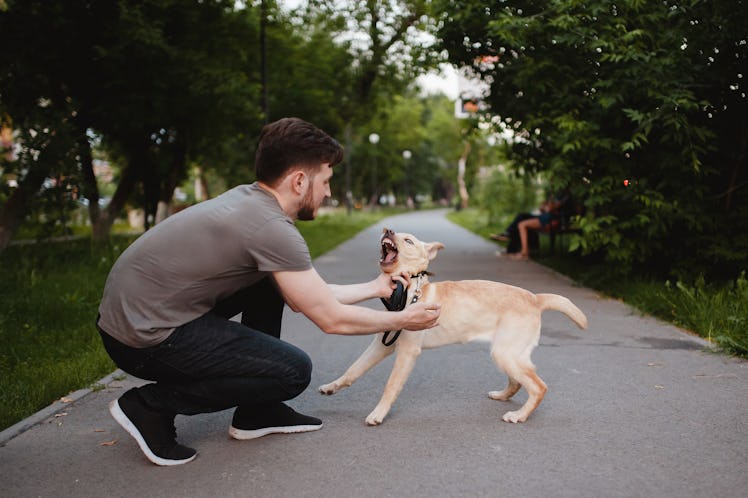Why Dogs Don’t Like Men As Much As Women
Ask any dog owner: Otherwise friendly canines will often allow a female stranger to pet them, but retreat from unfamiliar men. Why do dogs naturally fear men?

Dogs may be man’s best friend, but they sure have a strong preference for women. We’ve all heard that dogs can sense fear, but does their canine insight reveal deeper things about us? Ask any dog owner — otherwise friendly canines will often allow a female stranger to pet them, but retreat from unfamiliar men. So what is it about men and dogs? The reason for dogs’ apparent aversion to some men is almost certainly fear. So why do some dogs fear men?
First, let’s stress-test the premise. Kennel owners and veterinarians are known to hire female assistants, for instance, because of anecdotal evidence that dogs are more comfortable around strange women than men. Does this make sense? Yes, actually. In 1986, researchers tested this theory with a small sample of 20 dogs and found that although female dogs didn’t seem to mind strangers of either gender, “male dogs were much less likely to approach and make body contact with the unfamiliar man.”
“We’ve always speculated that it had something to do with the way men walked, or their bigger chests, larger jaws, or deeper voices,” writes Patricia McConnell, a Certified Applied Animal Behaviorist. “But we’ve never really known for sure what it was.”
Studies suggest that dogs are as comfortable with familiar men as they are with women. One 2015 study of interactions between men, women, and dogs at an animal hospital waiting room found “no specific difference in interaction rate and type between men and women.” And although an earlier study found that men and women speak to dogs differently, “there were no clear gender differences in affiliative and play behaviors,” when it came to dog owners.
The key may be how men approach dogs. A study in Current Biology asked volunteers to assess whether a lit-up human figure was walking toward them or away from them and found that male figures invariably appeared to be approaching while female figures appeared to be retreating. McConnell suspects that dogs may share in this perception. “Fearful dogs are always more afraid of something coming at them than they are at approaching something themselves,” she writes. And men, studies suggest, always seem to be approaching.
McConnell’s theory is untested, and experts can’t say definitively why dogs generally fear strange men. But although we may not fully understand the reason for this fear, behaviorists have well-tested solutions to the problem.
Ian Dunbar, Ph.D., a veterinarian, animal behaviorist, and dog trainer, suggests that skittish dogs be exclusively hand-fed, first by the owner, then, gradually, by strange women, and finally by strange men.
“Invite a number of female friends to hand-feed her,” Dunbar writes, regarding one fearful Chihuahua named Crystal. “From this, she learns the game she is later going to play with men. Fearful responses are exacerbated by not knowing how to act. You are going to imbue confidence in Crystal by teaching her how to act, first around women, then around men.”
As ever with dogs, the key is regular, positive reinforcement. “Ignore Crystal if she barks or snaps, but be sure to praise her whenever she is brave,” Dunbar writes. “Let her know how proud you are when she acts confidently.”
This article was originally published on